Press roundtable - Catacombes – our talk with Perdita Weeks
By Mulder, Paris, Mandarin Oriental , 04 august 2014
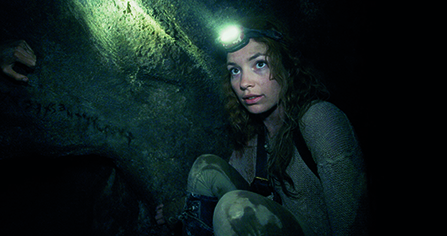
Q: Most of the film was shot down there in the catacombs. That seems like a really terrifying idea.
Perdita Weeks: The bit I had the most trouble with was where in the film we are going to the entrance of the catacombs, the police come and we have to scramble down this thing. I am not joking when I saw it, I was like, “You cannot be serious, you can’t expect me to go in there ! It’s not big enough. I am small and that’s going to be tricky.” It was a rabbit hole that went into these very tiny crawl spaces. They were going to put three of us in there : me, Ali and François. Marion really wanted to go in there. It was a bit much. But in the main system, there were twenty-five people, with lights, carrying wires, coffee and tea set up in the creepy caves, it just became like home. When we came back a month ago, to do some mocks and bits, it was bizarre to be down there again. But it was all the same people, it was great, like homecoming. You get used to the smell, that particular kind of musty, musky smell.
Q: Did you do some research for the character ? You are like a Lara Croft / Indiana Jones, type of adventurous scientist.
Weeks: Yes, it was quite daunting, the prospect of being well read on alchemy. I said, “please don’t test me on it”, because it went in one ear and come out of the other. That’s the great thing about this job : you get to learn about a whole new sphere of things. But it’s also about making up a lot of the back-story, justifying why she’s there in the first place. It was a brilliant idea and fascinating how they managed the link between the Philosopher’s stone and the law behind it. That’s the kind of thing I look for in a film. I love all that kind of fantasy genre, all that stuff that comes out afterwards and that makes sense, when the facts work in real life. This film really delivers on that.
Q: How did you prepare for the scream queen aspect of your role down there, being in an intense horror movie ?
Weeks: It’s no different from anything else, really. I was just trying not to smoke too many cigarettes off the set, so that I actually had a voice. I have already done a horror film before. It’s the most exhausting thing that you can do, because of the way that it was shot. We were shooting continuous scenes, ten to fifteen minutes sometimes. We were shooting those over and over again, so it became much more like theatre. It’s a brilliant way of doing it. It’s much more realistic and it really works. And this found footage vibe made it completely interesting for everyone. Sometimes, we finish a scene and everyone’s sitting behind the monitor, going “oh my god !” Especially the scene in the bone tunnel : we were weeping and hair and make up were crying. It was an emotional roller coaster ride for everybody, that scene with Edwin going absolutely nuts. It was tiring, but the main thing was to make sure that anyone was getting ill.
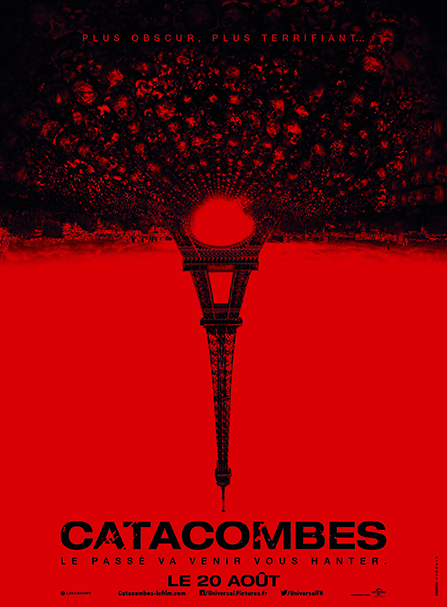
Q: We’ve just been told that in some of the scenes you just experienced what happened for the first time, it wasn’t rehearsed.
Weeks: They loved to do that. There were many things that we weren’t allowed to see. We were kept away from some aspects, so when we saw things for the first time, we were experiencing them for the first time. It is useful. The sets were so amazing. Lots of the aspects of the production were so extraordinary that it was real fun. I just had to scream a little bit.
Q: Is it true that you fought quite hard to get the part ? There were two different audition tapes for this role ?
Weeks: Yes, I think my first one was so bad. I got my mom and my boyfriend to do it. He’s terrible with technology and doesn’t know how to do it, so it’s completely out of focus. I was also blond, completely bright blonde hair at the time. So I staged that scene in my city and they asked only for a tape so we send them a tape. After that, I had to do it again in London with the casting director. It was all very, very quick though : two to three weeks from sending my first tape to actually being in Paris. The Dowdles came over and we all had a jolly good time with the camera. Then I knew : it’s in the bag.
Q: Were you aware about how many other people they were looking at ?
Weeks: Well, I wasn’t, I had no idea. I didn’t really know what had happened and why it was going so quickly. Basically, when I met Ben in Paris, the second time because the first was for the screen test, so when we started shooting, he said that all of his friends were up for this. And that everyone wanted to know who I was. That was kind of terrifying. And when my friends from London found out, they said they were up for it too. I didn’t know at the time, thank god ! So, it was like a surprise which came out of nowhere.
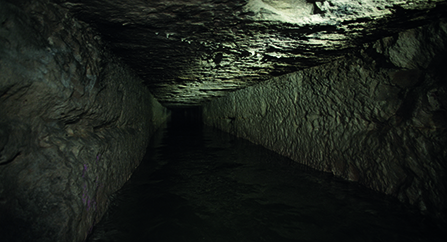
Q: How does it change your approach to acting to play in a found footage movie, where the camera is basically somebody who you talk to and react to ? It sounds much more complex.
Weeks: It actually was, it was something I had never done before. And I don’t see Scarlett having so much interaction with Benji. It was very difficult with some of the scenes, because he always had to be there to deliver his lines. But he wasn’t the one holding the camera, Léo, the director of photography, was holding it. So actually, I’m talking to him and sometimes he had to deliver the lines. For Léo, it was like actor training. It was so funny. He just got so much into it. It was very useful for us that he started acting almost as Benji, even if there was another Benji there. For example, when we come into to the cave where we find the stone and we hug, that’s Léo. It was odd and tricky at first. We had headlights that wouldn’t shine directly in somebody’s eye. These head cameras we had to wear were so heavy, this helmet with a big thing on top ! I had to wear a neck brace. If I had moved the wrong way, I would’ve broken my neck. But it somehow still worked. It felt very real, once we got used to having Léo there as the cameraman. He was really taking part. You’re in a real space with people who, by that time, you really care about, it was quite easy. We were allowed to just go, to just do it and see what happens.
Q: Your character is very ambitious, maybe over ambitious. Is that something you are familiar with as a person and an actress ?
Weeks: No, I just say that is one of the aspects of Scarlett that is definitely not like me. I don’t want to put people’s lives in danger for my own ill gotten gains. So no, but it is a really fun thing to play somebody who has one very strong motive for doing everything. It justifies every bit of her behaviour. It’s great if you have something that clear to work with.
Q: The stuff that happens to the characters in the catacombs when they get closer to what may be hell or some realm, is that real or is it just some kind of fantasy ? When you were reading the screenplay, did you need an idea of reality to go into this movie ?
Weeks: That’s a good question. These people are dead. They are gone. But the more time I spent on the set, the more it ceased to matter. There is a fantastical element to it which is what I loved about it. It’s up for everyone’s own interpretation. Obviously, those people don’t come out on the other end. They’ve been lost. Whether that was because their sins were worse and had swallowed them up to such an extent they weren’t able to escape. I think it’s more interesting and fun film if you don’t explain it. It’s more open to everyone’s interpretation. It opens the gate to, “so what happens next”. With the freaky stuff that happens around Scarlett, anything goes.
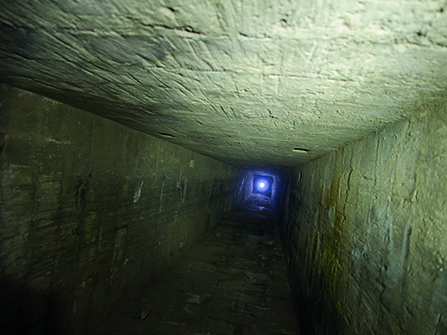
Q: I would like to know if you shot the film chronologically ? Was the scene when you finally come out of the catacombs shot on the last day ?
Weeks: I don’t really remember if that was the last day. I think it was the second to last day. The last day was the scene with the piano. We had done a lot by that point. It was great. We had spent a lot of time in the studio. All the really tricky stuff had been the studio stuff in the last two weeks. It was a pretty great shot. It was an amazing place to shoot. I couldn’t believe it. We were shooting that scene on a Friday night and for some reason it was party night on the banks of the Seine. There were hundreds of kids drinking and playing their music. I was covered in blood. I’ve got one of these foil sheets to keep me warm, that you give to mountain runners. Ben was all cut up. We just looked weird. It was the most bizarre place. It was absolutely extraordinary. There was Notre Dame. There we are getting upside down out of this manhole. I almost sprained my arm doing it. It was a great moment actually.
Q: You mentioned what happens next. There’s always the possibility the upside down Paris that they’ve emerged in is actually hell itself.
Weeks: That is definitely a question for John and Drew, one they’d absolutely love. Actually, this is hell. I love all this kind of pulling the threads. It’s a good question for them. That’s what they want.
Q: Can you tell us a little bit about your work with Ben ?
Weeks: It was quite a realistic relationship with Ben. We’d go through days just picking at each other. I mean, I absolutely love him. He is great ! He’s one of the funniest people that I’ve ever met. It was really fun. We have different methods. It was so much fun to work with him. He is so professional and just really good fun. The joking and the larks were absurd. We were all covered in blood and I was just cackling before this really serious scene. It was brilliant and we advanced to a place that shows in the film. We had a really easy relationship. That was very helpful.
Q: I am curious : what was a usual shooting day like down in the catacombs ? Did you go in and then you only came back up again at the end of the day ? Or was there some kind of an extra hole ?
Weeks: The film was shot in a few different systems. The system we used the most was Cochin. I don’t know if anyone has told you that the entrance to it is underneath a hospital. So in the days when we were shooting, all covered in blood, we would come out, walk past the emergency department and those people in there were so exhausted. I wish someone had gotten a brilliant photo of us, hanging out at the hospital, looking like we really needed to be there. We would go down in the morning and then you come up for lunch. There are no loo facilities down there. So you really have to run, because it takes about fifteen minutes to come back up. But no, it wasn’t too bad. You get used to it after a while.
Q: Are you interested in the history of the catacombs ?
Weeks: Yes, absolutely. We had this catacomb buff who was happy to answer our questions. It was extraordinary to find out that there were limestone quarries to build the Louvre. I had no idea. I had an idea about the catacombs. I’ve recently read a book about how they were made. It was partly fictional but very interesting. It’s such a cool place where not many people dare to go. Have you ever been to the place where the bones are lined up ? You’ve got a femur tunnel, a tibia tunnel and then the skulls. It’s very well done in the front, but in the back it’s just shoved and mismatched.
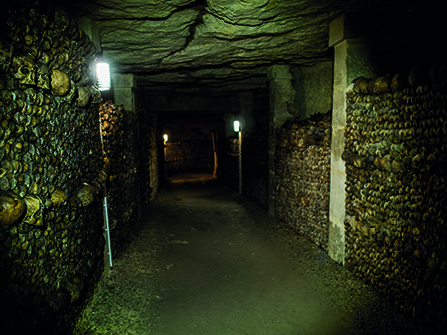
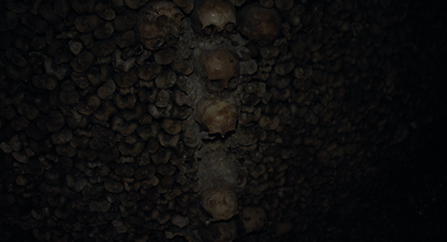
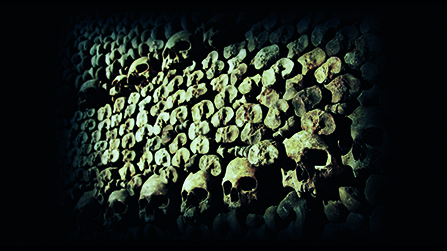
Propos recueillis par Mulder
Transcription: Mulder

